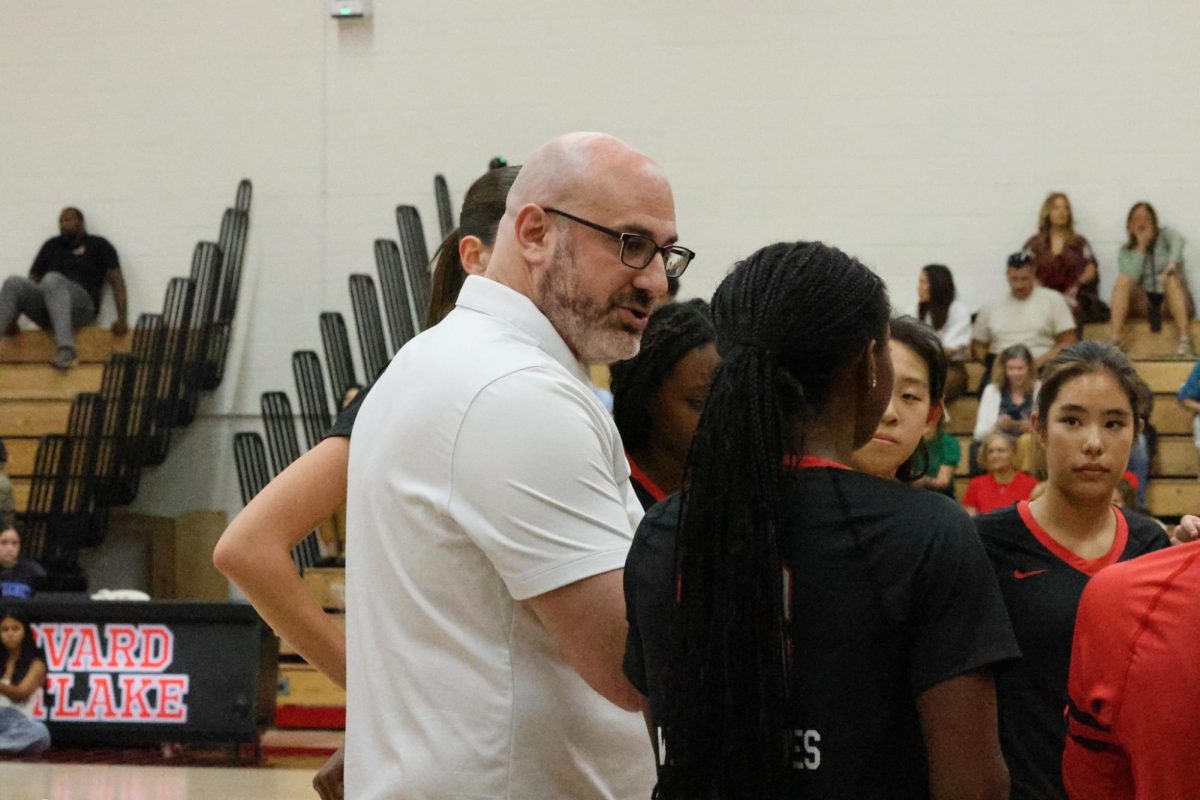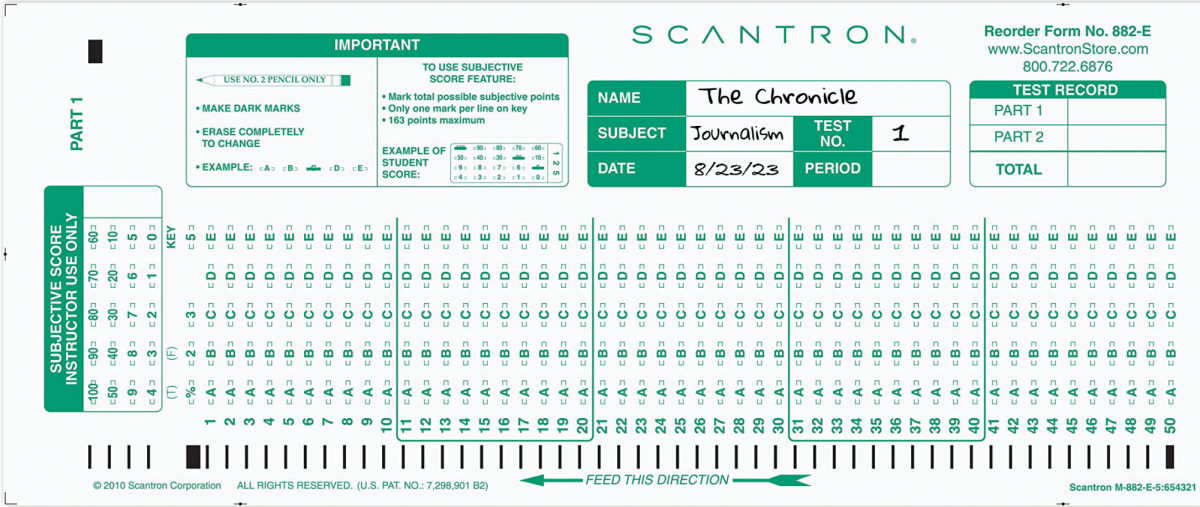It was the big day. Months of practice tests, tutoring sessions and caffeine had all been in preparation for this moment. However mere days before the scheduled exam, Ellie Whang ’24 felt her stomach drop as she stared at the thermometer; she had a fever. With no choice but to proceed with the PSAT, Whang stepped into the cold classroom.
“It sounds like a terrible excuse, but it’s not an excuse,” Whang said. “I was really sick for both of the PSATs. For me, it’s also hard to sit down on my own and get through a long test. Even after talking with [Erik DeAngelis], we both felt my scores didn’t actually reflect what I could do.”
Luckily for Whang, over 85% of four-year universities do not require either the SAT or the ACT, a policy that gained traction in 2020 as testing centers shuttered due to COVID-19, according to a press release from anti-testing organization FairTest. Whang said the results of her final attempt will determine whether or not she submits her scores.
“I’m trying not to put too much pressure on myself for my upcoming August SAT because then it won’t turn out well,” Whang said. “I think it’s great that so many colleges now are test optional. It doesn’t put as much pressure on me to have to get the highest score possible. Obviously, everyone’s situation is different, so whether they submit or not is completely their decision. Personally, I know that if I submit it, the test can help my application, but it won’t hurt it because so many schools are test-optional.”
While the majority of colleges are test-optional, only 4% of the nation’s colleges are test-blind, meaning they will not consider any standardized test scores, according to FairTest.
Editor-in-Chief of the Princeton Review Rob Franek said the option to submit a score can be a key differentiation between two similar applications.
“I tell my students [to] just take the test,” Franek said. “If you feel that your scores are indicative of your prowess and feel they are of value in the application process, then submit them. If you don’t feel satisfied with your SAT or ACT scores, exercise your test-optional right to withhold. If students decide at the very beginning to not take the test, they’re just hobbling themselves. We are seeing students deciding that they are going to use the SAT and the ACT as a point to differentiate themselves from other students that don’t choose to submit those scores.”
Only 43% of college applicants submitted a standardized test score in the 2022-23 admissions cycle, which is far lower than the pre-pandemic share of 74%, according to data from the Common Application. Sarah Parmet ’25 is preparing to take two SAT exams this fall and said not submitting a standardized test may look suspicious on her application.
“I think there’s a pressure of feeling like you have to submit [scores for] the college admissions process in general,” Parmet said. “I know that by not submitting a score, the [admissions office is] probably thinking, ‘Why didn’t you submit a score?’ I definitely want to get a high score, so I can send it because it can’t hurt [my application]. I don’t think it’s because of Harvard-Westlake that I feel that pressure. I think people everywhere feel the same way.” 
Another change that occurred as a result of the pandemic is the planned switch to an all-new digital SAT from the traditional paper exam, according to the College Board. The content on both the current and digital SATs will be highly comparable and will incorporate an adaptive testing model with a shorter test. Franek said keeping similar content should help alleviate some of the anxiety generated by the change.
“The College Board has been incredibly good about sharing information about the digital SAT in its new incarnation – they published practice questions in Aug. 2022 and published full-length practice tests in Nov. 2022,” Franek said. “I think it was a very sensible decision on the College Board’s part because having too much change at any one time causes so much worry and fear. The truth is that the content is essentially the same but with more difficult questions weighted more.”
In the annual College Hopes and Worries Survey, 12,000 students and parents were asked about their opinion of the digital SAT. 42% of respondents replied that they believe the digital SAT will be a better test, 25% think it will be more difficult and 24% are switching to the paper and pencil ACT, according to the Princeton Review. Senior Director at Compass Education Group Jon Lee said he has heard concerns from students and parents that are apprehensive about the digital exam.
“There are some students who really prefer a paper format,” Lee said. “Many of them are taking the SAT in the fall of 2023, while the test is still paper only in the U.S. Others are jumping to the ACT, which remains on paper. Another concern about the new format is the ‘multistage adaptive testing’ format, which steers students into different sections depending on their performance. Although this sounds like a highly technical innovation, it is not something students should be thinking about when taking the test. They simply need to do their best on every question.”
Parmet, who has taken both the digital PSAT and paper SAT, said the ability to mark up the paper was an important factor in deciding which version she preferred.
“There are definitely pros and cons to both,” Parmet said. “I found that you can actually press a little X over the answer you want to cross off like on the paper version. It can be kind of annoying for the math section and even the reading if you can’t underline. Another small reason is that when you’re doing that digital PSAT, your neck hurts less because you’re not fully looking down at a page. I know that’s like really trivial, but I don’t want to be sitting there with a neck ache while I’m trying to solve a math problem.”
Upper School Dean Sarah Miller said she hopes the new format will result in a better test-taking experience for students.
“The hope with the new digital SAT is that the test will be more consistent from one exam date to the next,” Miller said. “I [also hope] the results will be available quickly and that both user error and the ability to cheat will be minimized to an even lesser extent if not removed entirely. Almost no one loves taking these exams, but I can get on board with a new format that can provide the [student] with a cleaner and more streamlined experience.”
In addition to practice tests, Andrea Cruz-Vázquez ’25 said she plans to take the exam four times before it transitions to the digital format in January 2024.
“I really want to do well,” Cruz-Vázquez said. “With a bunch of colleges adopting test-optional policies, the Supreme Court affirmative action case and essays becoming more important, the test probably doesn’t matter as much. It’s kind of just a great personal accomplishment after all of the studying and hard work I have put in.”
Franek said he recommends only taking either official exam twice as most students tend to reach their mental limit around the third test.
“I’ve learned from all of my students that you really shouldn’t take the test more than three times,” Franek said. “Some students are like, ‘I just want to improve this last couple of points.’ In my experience, after the third time, students tend not to improve much more. It’s not because of the content, but because of the confidence that they may have lost and the fatigue of taking that test again. I think the perfect number of times to take the official test is two.”
Beginning in September 2020, the ACT had planned to allow digital single-section retesting, provided a student had previously completed a full exam, but the plan was discontinued following the pandemic’s outbreak, according to ACT, Inc. Franek said the ACT was ready to go digital but is holding back in view of the SAT change.
“The ACT was already primed to [go digital], but now they have been eerily quiet since the announcement from the College Board,” Franek said. “It’s funny because if history proves correct, students will either flock to the current test before it changes because it’s kind of the evil that you know, or they will select the other test in town like the ACT. So, the ACT might just be sitting there and waiting for those students to shift to the current pencil and paper test before they go to a digital format.”
On top of standardized testing, the college application process typically includes a general personal statement and supplemental essays for each school. The personal statement is gradually becoming more important than standardized testing, according to U.S. News. Franek said he believes the future of college admissions will place more emphasis on essays and Advanced Placement (AP) exams.
“We actually just launched [a program] that uses AI for college essay review,” Franek said. “It’s not rewriting your essay but using AI for you to gain feedback on your essay. As we move forward, the college essay is going to become even more critical in the process as it’s a great way to differentiate yourself from other students academically. I also think AP exams are going to grow in importance. Pre-pandemic, there were 5.1 million AP exam administrations but there were only 2.2 million administrations of the SAT. It’s just incredibly more profitable for the College Board to run AP exams. [AP Exams] also are testing your ability to master the knowledge of that discipline, not just teaching for a test.”
Miller said every dean will continue to help support students with any aspect of their application.
“To no surprise, the emphasis on thoughtful, reflective, well-written essays is sizable,” Miller said. “Our job as deans is to help students make sure their personal statement, their supplemental essays and their Personal Insight Questions for the [University of California (UC)] System are showcasing the most interesting, authentic and valuable aspects of their story. Often this includes helping a student identify an aspect of their story that would be rather interesting to a college, that perhaps the student has not fully recognized yet. I’ve seen some of the most compelling writing in this process come out of some of the simplest stories.”
Whang said she enjoys reflecting on her past memories and embraces that as a part of the writing process.
“I’m personally someone who’s a lot better at writing essays than taking standardized tests,” Whang said. “I’ve spent a lot of time [this summer] just thinking and writing, even just really bad rough drafts, and seeing if I have any substance in them. I know it sounds kind of weird because everyone talks about how they hate writing college essays, but I kind of enjoy it. I like having to sit with my thoughts and really think about what makes me a person and what experiences have shaped me.”
































Dominique Padurano, Ph.D. • Sep 5, 2023 at 3:04 pm
As a college essay counselor and SAT / ACT coach, I found this article really well written; bravo!
ADH • Aug 28, 2023 at 3:30 am
Finally, a thorough and solid article about both the SAT and ACT.